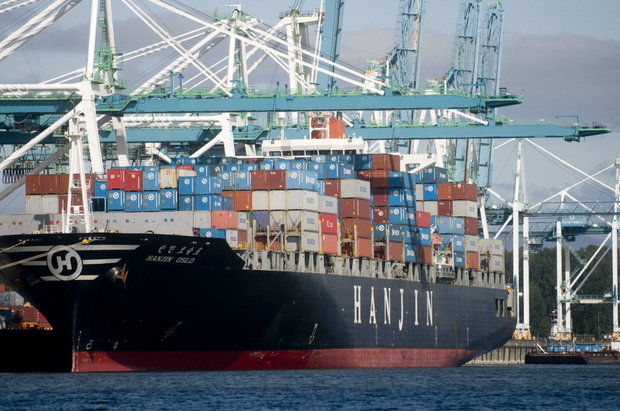forum
library
tutorial
contact

Port, State Officials Discussed Letting Hanjin Walk
Before Increasing Incentive Package
by Luke Hammill
The Oregonian, September 22, 2016
|
the film forum library tutorial contact |

|
Port, State Officials Discussed Letting Hanjin Walk
by Luke Hammill
|
 Port of Portland officials appeared willing to let a major shipping company leave Terminal 6, according to emails and public records. But they later reversed course and doubled the amount of an incentive package for the company in a last-ditch effort to keep its business.
Port of Portland officials appeared willing to let a major shipping company leave Terminal 6, according to emails and public records. But they later reversed course and doubled the amount of an incentive package for the company in a last-ditch effort to keep its business.
The reversal is documented in emails The Oregonian/OregonLive previously obtained from the office of then-Gov. John Kitzhaber, who took a keen interest in resolving the ongoing labor issues at the container terminal.
About a year after ICTSI took over Terminal 6 in 2011, the longshore union made claim to two jobs that had traditionally belonged to Port employees from the local electricians' union. The jobs involved plugging in and unplugging refrigerated containers called "reefers."
The longshoremen claimed their contract with the Pacific Maritime Association gave them the right to the work. But the Port's lease with ICTSI assigns the work to the electricians, and the Port insisted that things remained that way. Productivity at Terminal 6 plummeted; the union was accused of deliberately slowing down work.
Korea-based Hanjin Shipping was reeling amid turmoil in the worldwide container business and at Terminal 6. In an effort to keep the company coming to Portland, the Port in 2013 awarded the company $10 for every container it moved through the port. But as labor strife continued, the company began threatening to leave anyway.
"They have asked to meet with us in Portland and will, no doubt, be seeking additional financial assistance which we will not agree to," wrote Port of Portland Executive Director Bill Wyatt in an October 2013 email to Curtis Robinhold, then the governor's chief of staff and now Wyatt's deputy.
Soon after that, Kitzhaber, in an effort to save business at the terminal, assigned the reefer jobs to the longshoremen. The deal was contingent on increased productivity at Terminal 6 but did not include specific requirements, Wyatt said in written court testimony. The union has denied it agreed to those terms.
In January 2014, Kitzhaber staffer Duke Shepard wrote Wyatt, saying, "the Governor asks about this every time I speak to him." By then, Wyatt had changed his tune about the increased subsidies to Hanjin.
"We have discussed with (Hanjin) an 'incentive' package. ... This will cost us a little over $3.5 million this year," Wyatt replied. "I don't like doing this, but I don't think we have a choice. ... I am convinced that without this they would leave."
The Port commission voted the next month to up the subsidy to $20 per container. Hanjin stayed, for the time being.
But later in 2014 -- in the midst of contract negotiations up and down the West Coast between the longshore union and the Pacific Maritime Association, to which ICTSI belongs -- there was more trouble. The longshoremen hadn't increased productivity to the Port's and ICTSI's liking, and the Port wanted to return the reefer job to its electricians.
"(The Pacific Maritime Association) asked the Port to once again stand down on the reefer switch back," Shepard wrote in September 2014 to Kitzhaber. "Bill and I had the same reactions -- no way. We tried that. (The longshore union) has not demonstrated any good will at all."
The next month, Wyatt submitted a declaration in federal court explaining his position:
"Because the (longshore union) did not cease its slowdowns at Terminal 6, the Port gave 30 days' notice ... that the reefer work contract would be terminated, thereafter took back the reefer work, and now has its own employees ... again performing the work as they have done for decades."
Hanjin left for good a few months later, followed by the other shipping lines.
Key dates1974: Terminal 6 opens.
-- Compiled by Kelly Yan
1991: Michael Thorne becomes executive director of the Port of Portland.
2001: Bill Wyatt becomes executive director.
2004: Two major carriers stopped service to Terminal 6, taking with them more than 50 percent of the port's container volume.
2011: International Container Terminal Services Inc. takes over operation of Terminal 6.
2012: The longshore union claims jurisdiction over refrigerated container jobs that had traditionally belonged to Port electricians. Work slows down at the port.
2013: The port offer Hanjin financial incentives to keep calling at Terminal 6. Longshoremen are given the reefer jobs.
2014: Port gives reefer jobs back to the electricians.
2015: Hanjin leaves Terminal 6.
2016: Westwood Shipping Lines makes its final call at Terminal 6, leaving it idle.
learn more on topics covered in the film
see the video
read the script
learn the songs
discussion forum
